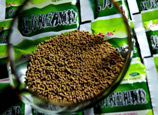
An epidemiologist from the Chinese Center for Disease Control and Prevention (China CDC) Tuesday said humans are less prone to infection from the H7N9 avian influenza than to the A/H1N1 flu and SARS, as the country's health authorities raised the tally of confirmed H7N9 cases to 28.
Zeng Guang, chief epidemiologist at the China CDC, made the remarks in a telephone interview with the Global Times on Tuesday. "Humans' susceptibility to the H7N9 virus is only a little bit higher than to that of H5N1," he added.
Zeng said that after comparing the gene sequence of the H7N9 virus in confirmed cases, no mutation of the virus had been detected at this point.
At a joint media briefing by the National Health and Family Planning Commission and the World Health Organization on Monday, Shu Yaolong, deputy director of the National Institute for Viral Disease Control and Prevention under the China CDC, said the influenza virus constantly mutates, and no one can tell how this strain is going to mutate.
According to health authorities in Jiangsu Province, an 83-year-old patient in Suzhou, whose infection of the H7N9 bird flu was confirmed on April 2, died Tuesday afternoon despite rescue efforts.
Another patient, an Anhui resident, also died Tuesday despite treatment in Nanjing, raising the death toll to nine.
In neighboring Zhejiang Province, the local health department detected two new confirmed cases. A 79-year-old patient is in critical condition, while another patient, 51, is in stable condition despite showing acute symptoms.
In Shanghai, the worst-hit region, two new confirmed cases were reported Tuesday. The two patients, 62 and 77 respectively, are both in stable condition. Ten people known to have been in close contact with them have been put under medical observation and showed no abnormal symptoms.
Currently, the 28 confirmed cases have been found in Shanghai and nine cities in East China's Zhejiang, Jiangsu and Anhui provinces.
"The confirmed cases are widely scattered, but the number of cases is currently limited. It demonstrates the susceptibility of humans to such infections is low," Zeng said.
Some of the patients had contact with live poultry, and the H7N9 virus was detected in pigeon, chicken and quail in Shanghai and Zhejiang.
In the wake of the findings, Shanghai has slaughtered more than 111,000 fowl and many of the affected areas have suspended live poultry markets.
In Nanjing, Jiangsu Province, some school canteens have suspended supply of chicken and duck to students, the Yangtze Evening News reported. Xiamen Airlines has also reportedly suspended supplies of poultry-made food for in-flight meals.
According to Reuters, New Hope Group, China's largest animal feed producer, said its business has been affected by the H7N9 avian influenza.
Liu Yonghao, board chairman of New Hope Group, said the company has come under pressure, given the lower consumption of chicken due to the disease, especially in eastern China. According to him, the price of chicken has dropped under production costs due to depressed market demand.
The People's Daily Tuesday reported that a preliminary analysis shows that H7N9 bird flu has not triggered an epidemic among poultry, citing the government's chief veterinarian Yu Kangzhe.
It said of the 738 samples collected from three live poultry markets in Shanghai, only 20 samples contained the virus, including 10 from chickens, three from pigeons and seven from environmental samples.
Yu also said that it is still safe to eat poultry meat purchased from regular channels, such as supermarkets, as long as they are thoroughly cooked.
Separately, the family of Wu Liangliang, a 27-year-old man in Shanghai who was one of the first two confirmed patients and died of the disease, claimed compensation of 1.07 million yuan ($172,500) from the hospital, youth.cn reported.
The hospital finally compensated 130,000 yuan to Wu's family on March 27, four days before health authorities announced the discovery of the newly detected disease.
Latest development of H7N9 in China[Special]
















 Stand in face of bulldozer
Stand in face of bulldozer
With water and electricity cut, lonely 'Nail House' struggling to stay


![]()
